Artificial intelligence (AI) has evolved from a futuristic concept into a driving force behind innovation across various industries in the last decade. AI is revolutionizing how businesses operate, from healthcare to finance, and its impact is perhaps most visible in marketing. Imagine a world where campaigns are no longer built on intuition or outdated trends but on real-time, data-driven insights that adapt and evolve alongside consumer behavior. This is no longer a distant vision; it’s the reality AI is creating for modern marketers.
Marketing today is more complex and dynamic than ever before. With consumers bombarded by thousands of messages daily, the challenge lies in standing out and delivering the right message to the right audience at precisely the right moment. Data-driven decision-making has become essential, with marketers relying heavily on analytics to track everything from customer behavior to campaign performance. However, traditional marketing methods often struggle to process vast amounts of data quickly enough to provide actionable insights in real–time. This is where AI emerges as a game-changer, offering the speed and accuracy needed to optimize campaigns in an increasingly competitive landscape.
This blog will explore how AI-driven marketing analytics reshapes campaign strategies and performance. By harnessing advanced AI tools, businesses can implement more personalized, targeted, and efficient marketing approaches that drive higher engagement, better customer retention, and, ultimately, superior return on investment (ROI). The following sections will delve into how AI is redefining marketing and profoundly enhancing the effectiveness of campaigns.
1. The Role of AI in Marketing Analytics
In today’s hyper-competitive market landscape, marketing success hinges on understanding and anticipating customer needs. This is where AI-driven marketing analytics transforms traditional marketing approaches by turning vast raw data into actionable insights. Unlike traditional analytics, which often rely on historical data and manual interpretation, AI-driven analytics leverages machine learning and advanced algorithms to analyze past performance and predict future trends and behaviors. This transition marks a fundamental shift in how campaigns are strategized, executed, and optimized—empowering marketers with precision, speed, and scalability that traditional methods cannot match.
At its core, AI-driven marketing analytics is about using artificial intelligence to automate the processing of large datasets and generate insights that guide decision-making. Traditional analytics often involves collecting data, manually interpreting trends, and applying static strategies that cannot adapt in real time. In contrast, AI-driven analytics continuously learns from new data, allowing marketers to make data-driven decisions with unprecedented accuracy and timeliness. With AI, the guesswork is eliminated, as data becomes the central pillar in driving more personalized, relevant, and high-impact marketing campaigns.
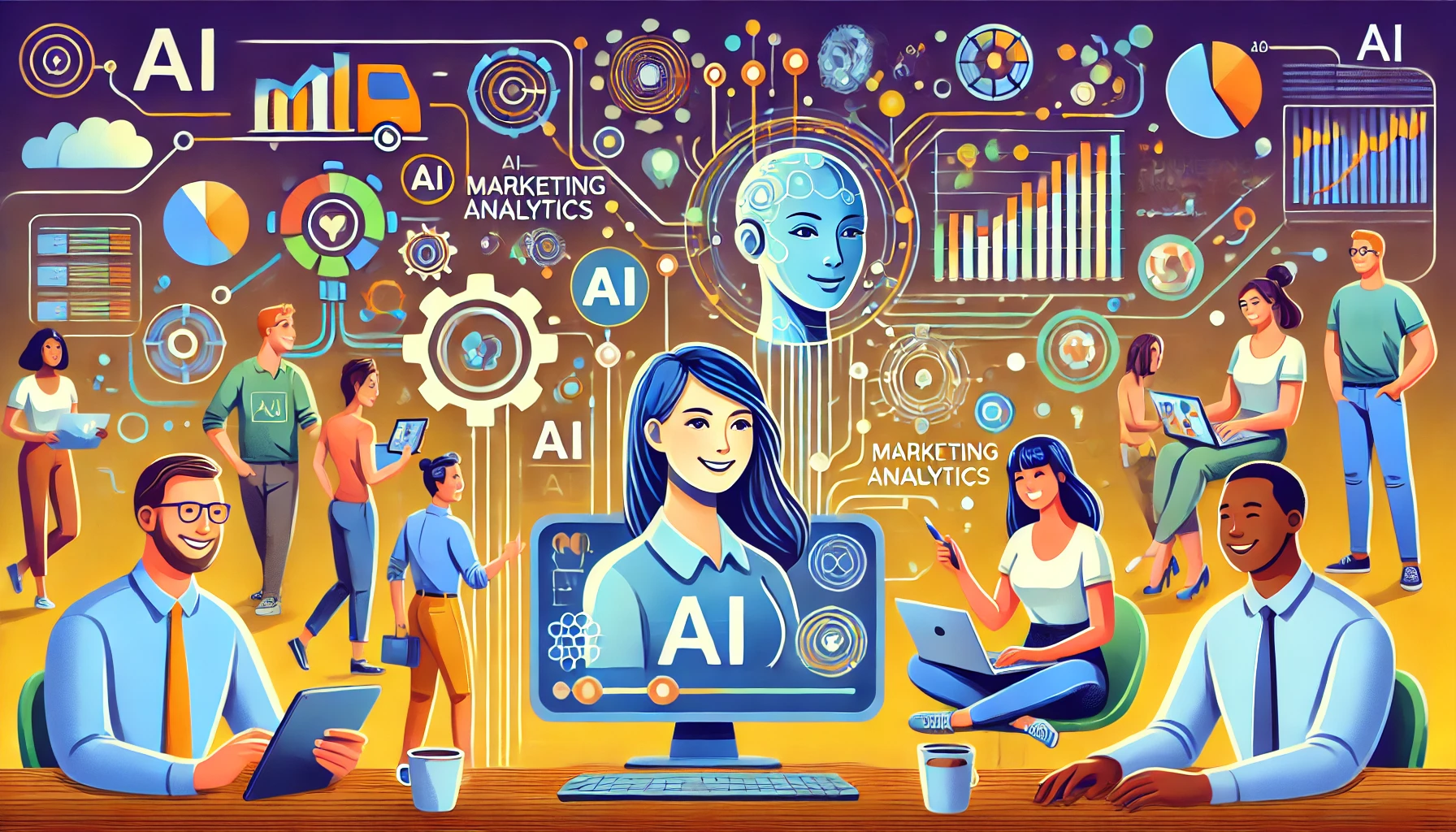
1.1 Data-Driven Decision Making
AI’s most significant contribution to marketing analytics is its ability to empower data-driven decision-making. In the past, marketers often relied on intuition or outdated reports to make critical decisions. While this may have worked somewhat, it was prone to bias and human error. AI revolutionizes this process by providing real-time insights from vast amounts of data. Whether predicting customer preferences, identifying the most effective channels, or optimizing ad spend, AI enables marketers to act quickly and confidently.
A prime example of this is the use of predictive analytics. By analyzing patterns in customer behavior, AI can forecast future actions, such as which product a customer is likely to buy next or which marketing message will resonate most effectively. This level of foresight allows companies to create highly targeted campaigns that can adapt to changes in customer behavior, making them more efficient and cost-effective.
The role of AI in marketing analytics is transformative, driving a new era of precision and efficiency in decision-making. By leveraging technologies like machine learning, natural language processing, predictive analytics, and recommendation systems, businesses can create more effective campaigns, improve customer experiences, and achieve superior marketing performance.
2. Key AI-Driven Tools for Marketing Analytics
The advent of artificial intelligence in marketing has revolutionized how businesses approach data-driven decisions. AI-powered tools for marketing analytics not only automate labor-intensive processes but also unlock a deeper understanding of customer behavior, enabling companies to tailor their strategies precisely. These platforms leverage sophisticated algorithms to analyze vast data, predict future trends, and optimize campaigns in real–time. As a result, they have become indispensable for modern marketers seeking to stay ahead of the competition.
2.1 Case study: Coca-Cola – Leveraging AI for Optimized Marketing Campaigns
Coca-Cola, one of the world’s most iconic brands, has long been at the forefront of adopting innovative technologies to maintain its competitive edge. In recent years, Coca-Cola has embraced artificial intelligence (AI) as a central pillar of its marketing strategy, using it to refine its campaigns, enhance customer engagement, and improve return on investment (ROI). Through AI-driven marketing analytics, the company has analyzed vast amounts of consumer data, predicted trends, and optimized its marketing efforts in real–time, ensuring that its campaigns remain relevant and effective in a fast-changing marketplace.
Sentiment Analysis in Real Time
One key area where Coca-Cola has successfully integrated AI is sentiment analysis. The brand uses AI-powered tools to monitor millions of social media interactions, customer reviews, and online conversations in real time. These tools, powered by natural language processing (NLP) algorithms, scan and interpret positive, neutral, or negative customer sentiments around the brand and its products.
In 2020, Coca-Cola applied sentiment analysis to monitor the public’s reactions to its “Share a Coke” campaign, where personalized Coke bottles with consumer names were sold worldwide. Using AI to track social media reactions, Coca-Cola quickly identified which names resonated most with different regions and customer groups. This enabled the company to refine its campaign by targeting specific areas with the most famous names, maximizing engagement. Figures suggest that Coca-Cola achieved a 2% increase in U.S. sales due to this campaign. Furthermore, customer engagement skyrocketed, with 500,000 photos shared on social media featuring personalized Coke bottles, all tracked and analyzed in real time through AI systems. This level of insight would have been impossible using traditional marketing analytics, where post-campaign reports may have delayed action.

Optimizing Ad Targeting with Predictive Analytics
Beyond sentiment analysis, Coca-Cola also leverages predictive analytics to effectively target its ads. The company uses machine learning algorithms to analyze customer data, such as purchasing behavior, location, and demographic information, to predict which consumer segments are most likely to respond to specific campaigns. This predictive modeling enables Coca-Cola to create highly targeted ads tailored to the preferences and behaviors of individual consumers.
For example, Coca-Cola used AI-driven tools to optimize its digital ads during the 2018 FIFA World Cup. By analyzing consumer engagement and social media interactions related to the event, AI tools helped Coca-Cola adjust its ad spend in real–time, focusing on regions and customer groups showing the highest likelihood of engagement. This campaign generated over 1.5 billion impressions, and Coca-Cola experienced a significant uplift in brand visibility and sales during the tournament.

Automation of Marketing Campaigns
Automation has also played a critical role in Coca-Cola’s marketing strategy. Using AI tools, the brand has automated vital tasks, such as A/B testing and campaign management, to optimize performance with minimal human intervention. Coca-Cola’s AI-powered systems test different ads, creative content, and messaging versions to determine which variants perform best across various audience segments. This process, which once required extensive manual effort and time, now happens instantaneously through AI, ensuring that the company consistently delivers high-performing ads.
For instance, Coca-Cola’s AI-driven A/B testing allowed the brand to experiment with multiple variations of digital ads during its Diet Coke relaunch campaign in 2018. AI systems identified the combinations that resonated most effectively by testing different creative elements across various audience segments, such as colors, slogans, and visuals. This automated testing resulted in a 4% increase in brand favorability and a measurable impact on sales for the newly launched Diet Coke flavors.
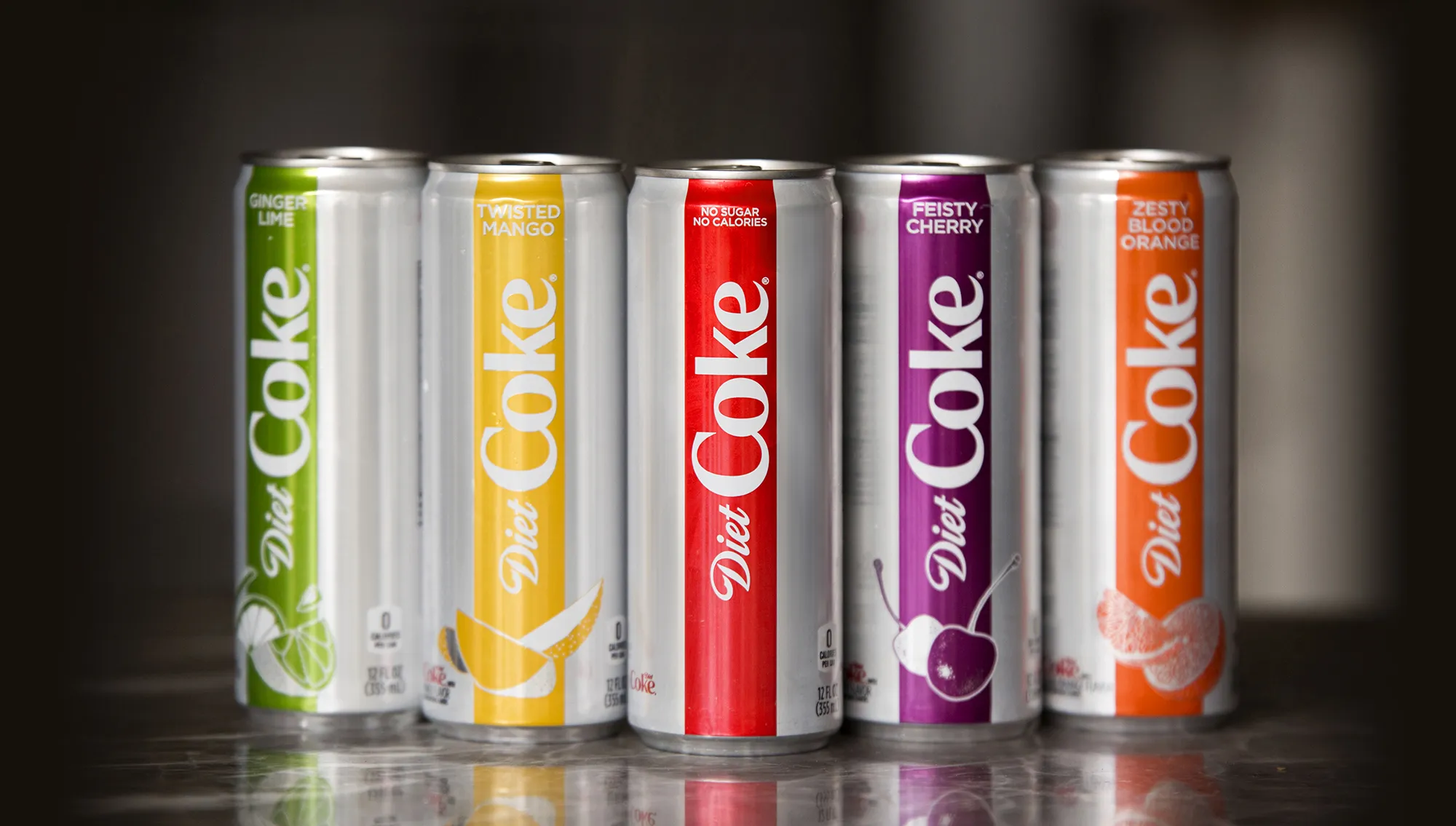
Data-Driven Innovation and Product Development
AI’s capabilities at Coca-Cola extend beyond marketing campaigns to product development. The company uses AI to analyze consumer preferences and predict future trends in taste and packaging. For example, Coca-Cola’s AI systems analyze customer feedback and social media trends to identify emerging flavors that may appeal to specific markets. These insights enable the company to innovate and introduce new products with a higher likelihood of success. In one notable instance, Coca-Cola launched its Cherry Sprite flavor based on AI-driven insights. The company’s AI platform analyzed thousands of customer comments and social media posts, identifying a growing demand for cherry-flavored drinks. This data was further reinforced by AI’s ability to predict sales trends based on historical data and market analysis. By integrating AI insights into its product development strategy, Coca-Cola launched Cherry Sprite with strong initial sales and high customer satisfaction.
Coca-Cola’s successful integration of AI into its marketing analytics and campaign strategies underscores the power of AI-driven tools to transform brand engagement, optimize advertising, and predict consumer behavior. By leveraging AI technologies like sentiment analysis, predictive analytics, and automation, Coca-Cola has adapted to customer preferences and market shifts in real time, driving significant gains in brand loyalty and sales. This case study demonstrates AI’s effectiveness in optimizing marketing performance and provides a glimpse into how AI is shaping the future of personalized and data-driven marketing.
![]()
3. Challenges and Limitations of AI in Marketing Analytics
While artificial intelligence (AI) has revolutionized marketing analytics, enabling brands to optimize campaigns precisely, it’s not without challenges and limitations. As more businesses adopt AI-driven tools, they often encounter obstacles that need to be addressed to unlock the full potential of these technologies. Understanding these challenges is crucial for navigating the complexities of AI and ensuring that its implementation yields the desired results.
Data Quality and Quantity
One of the foundational requirements for AI’s success in marketing analytics is the availability of high-quality, abundant data. AI algorithms use vast data to generate accurate insights, make predictions, and optimize campaigns. However, poor data quality or insufficient data can severely compromise the effectiveness of AI systems. Inconsistent, incomplete, or biased datasets can lead to flawed conclusions, resulting in marketing strategies that miss their target or alienate key customer segments.
For instance, an AI system trained on outdated or skewed data might inaccurately predict customer preferences, leading to misdirected advertising spend. A study by IBM found that insufficient data costs businesses in the U.S. more than $3 trillion annually due to inefficiencies, poor decision-making, and missed opportunities. Therefore, companies must invest in ensuring the quality, diversity, and relevance of their data to reap AI’s full benefits.
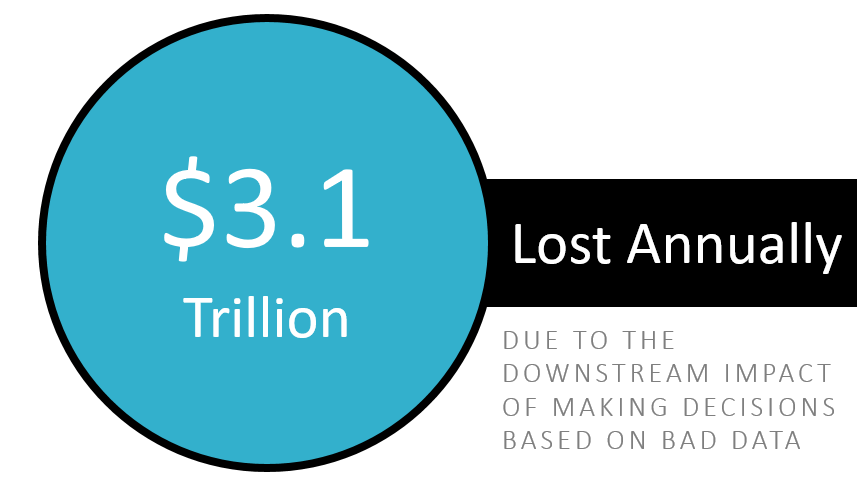
Data quantity is also critical. While small datasets may provide some insights, AI thrives on big data, which allows it to identify nuanced patterns and trends that smaller datasets might miss. For companies with limited data access, achieving the scale necessary for AI to perform optimally can be a challenge, potentially limiting the sophistication and accuracy of their marketing analytics.
Cost and Implementation Complexity
Another major hurdle for businesses—tiny and medium-sized enterprises (SMEs)—is the cost and complexity of implementing AI systems. Significant upfront investments, including software costs, data infrastructure, and specialized talent, often accompany AI-driven marketing platforms. Gartner estimates that 40% of AI projects stall at the implementation phase due to unforeseen costs and difficulty integrating AI with existing systems.
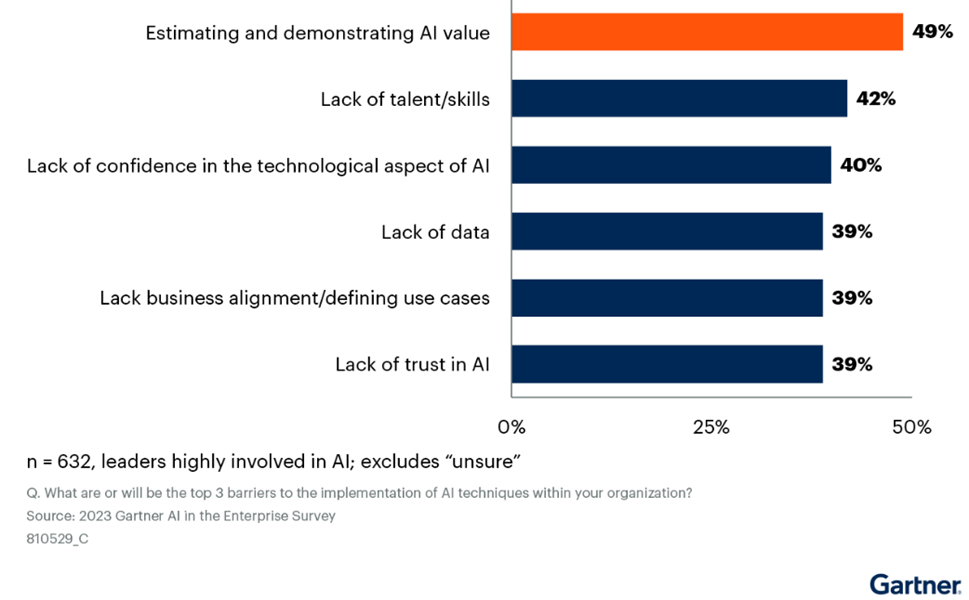 The implementation of AI requires not only financial resources but also technical expertise. Businesses need data scientists, engineers, and AI specialists to set up, maintain, and optimize these systems. For smaller companies, the cost of hiring or training in-house experts and purchasing the necessary technology can be prohibitive. Moreover, ongoing maintenance and updates are required to keep AI models accurate and responsive to market changes, adding to the complexity and long-term cost considerations.
The implementation of AI requires not only financial resources but also technical expertise. Businesses need data scientists, engineers, and AI specialists to set up, maintain, and optimize these systems. For smaller companies, the cost of hiring or training in-house experts and purchasing the necessary technology can be prohibitive. Moreover, ongoing maintenance and updates are required to keep AI models accurate and responsive to market changes, adding to the complexity and long-term cost considerations.
Ethical Concerns
The use of AI in marketing analytics brings a series of ethical challenges, especially concerning data privacy, algorithmic bias, and transparency. AI systems rely on customer data, and with increasing awareness around data privacy, consumers are growing more concerned about how their personal information is used. According to a PwC survey, 83% of consumers want more transparency over how companies use their data. If businesses fail to address these concerns, they risk losing customer trust, which could severely impact brand loyalty and reputation.
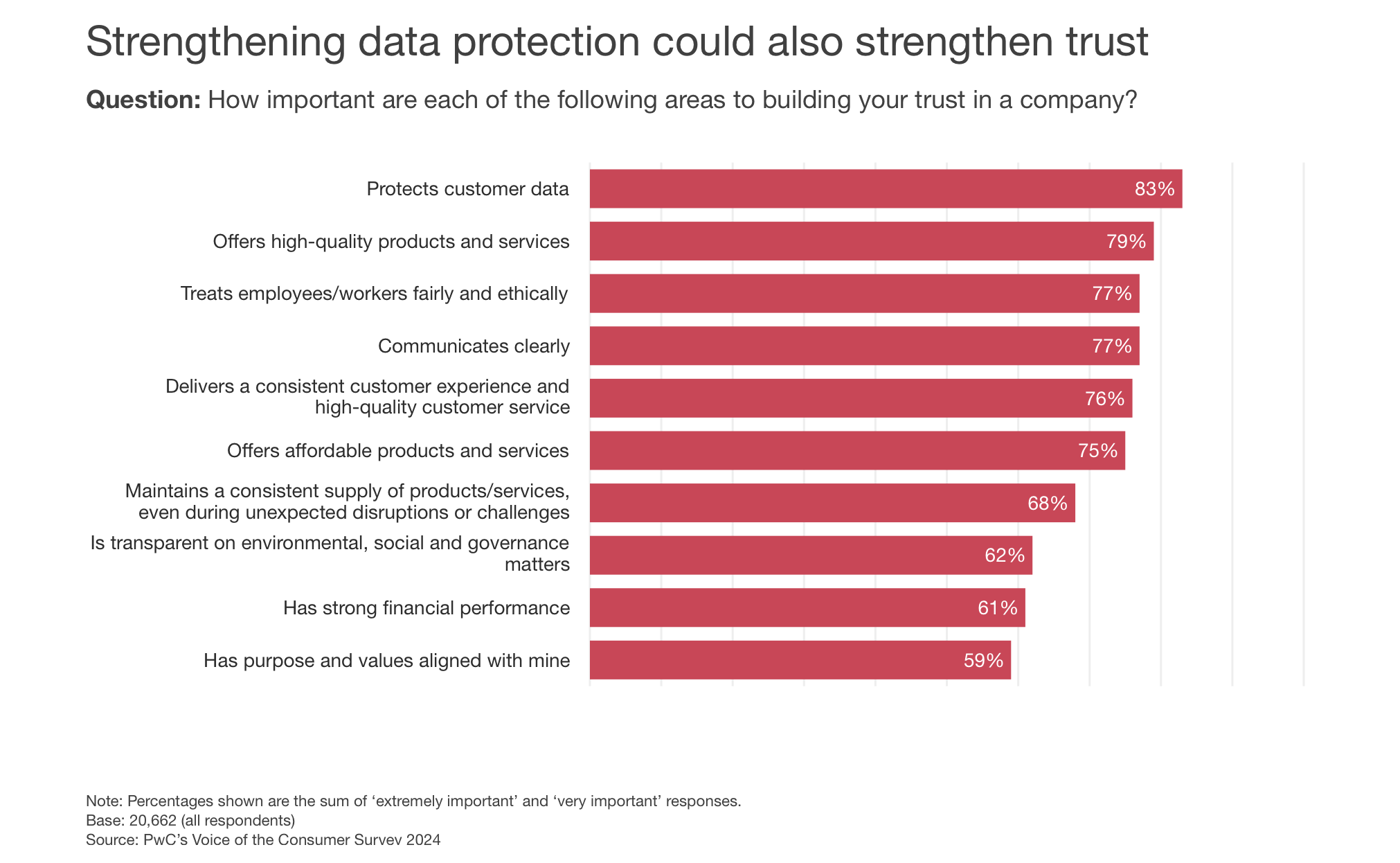
Moreover, AI algorithms are susceptible to biases embedded in the data on which they are trained. The AI can perpetuate or amplify these biases in its predictions and recommendations if the training data contains biased information—such as underrepresenting specific demographics. This is particularly concerning when AI is used in customer segmentation, where biased algorithms might unfairly exclude or target particular groups, leading to discriminatory outcomes. For example, an AI system designed to identify high-value customers could inadvertently favor one demographic based on biased historical data, limiting the inclusiveness of a brand’s marketing efforts.
Ethical issues also arise from some AI systems’ “black box” nature. These systems can make decisions without providing clear explanations, making it difficult for marketers to understand how certain conclusions were reached. This lack of transparency can lead to distrust and resistance within marketing teams and consumers. While AI offers immense potential to revolutionize marketing analytics, businesses must navigate several challenges to ensure its success. The reliance on high-quality, abundant data, the cost and complexity of implementation, ethical concerns around privacy and bias, and the balance between human expertise and machine learning all represent critical considerations. Understanding and addressing these limitations will enable businesses to harness AI more effectively, ensuring its application in marketing analytics drives performance and fosters trust and innovation responsibly and sustainably.
4. The Future of AI-Driven Marketing Analytics
The role of AI in marketing analytics is evolving rapidly, and its future promises even more transformative capabilities. From deeper predictive insights to integrating emerging technologies, AI will continue to shape how marketing strategies are designed and executed.
AI and Multi-Channel Campaigns
As customer journeys become increasingly complex, spanning multiple digital and offline touchpoints, the future of marketing will depend heavily on AI’s ability to optimize multi-channel campaigns. AI will be pivotal in delivering seamless, personalized experiences across channels—whether through email, social media, mobile apps, or physical stores.
In the future, AI will help marketers orchestrate campaigns that adapt in real-time across channels. For example, if a customer engages with a brand via social media, AI systems can instantly tailor the messaging they receive through email or display ads. Research by Salesforce shows that 74% of customers expect companies to adapt based on their interactions in real–time, and AI’s role in achieving this level of personalization will become increasingly critical.

Emerging Technologies
Emerging technologies like AI-powered voice search, augmented reality (AR), and blockchain will further impact marketing analytics, driving new levels of engagement and transparency.
- Voice Search: As voice search continues to grow, AI-powered tools will need to optimize content for voice-driven queries, offering new opportunities for brands to engage with consumers through smart speakers and virtual assistants.
- Augmented Reality (AR): AR and AI will revolutionize customer experiences by allowing users to interact with products virtually. AI-driven marketing analytics will be able to track how customers engage with AR experiences and optimize campaigns accordingly. For instance, beauty brands like Sephora already use AI-powered AR to allow customers to virtually “try on” products, creating highly personalized and interactive shopping experiences.
- Blockchain: While still in its infancy in marketing, blockchain combined with AI could ensure greater transparency and security in digital advertising. Blockchain’s decentralized technology will help track data usage more effectively, giving consumers control over their data and fostering trust between brands and customers.

5. Overview
In today’s data-driven world, the role of AI in marketing analytics is undeniable. AI-driven tools have revolutionized how businesses approach their marketing strategies, offering unparalleled precision, speed, and efficiency. From predictive analytics to real-time personalization, AI is reshaping the landscape, allowing companies to target the right audience with the right message at the right time. The ability to harness vast amounts of data and turn them into actionable insights is no longer a luxury but a necessity for staying competitive in the ever-evolving digital marketplace.
The key takeaways are clear: AI-driven marketing analytics provides businesses with the tools to optimize campaign performance, enhance customer experiences, and drive higher ROI. By leveraging AI for tasks such as predictive insights, A/B testing, and personalized marketing, companies can scale their efforts with greater precision and less manual oversight. Yet, challenges such as data quality, ethical considerations, and balancing human expertise with AI outputs remain critical in ensuring success.
6. About Applied AI Lab
As AI advances, businesses embracing these technologies will be best positioned to lead in their respective industries. Companies that have not yet integrated AI into their marketing strategies risk falling behind. Now is the time to explore how AI-driven marketing analytics can help optimize campaign performance, boost engagement, and deliver a more personalized customer experience.
At Applied AI Lab, we specialize in designing bespoke AI solutions tailored to your needs. Whether you want to improve operational efficiency, drive innovation, or better understand your customer base, we have the tools and expertise to guide your AI journey. Our AI Readiness Assessment helps identify your business’s most effective AI strategies, ensuring a smooth and successful implementation.
Transform your business with our tailored AI solutions. Speak with our team of AI pioneers today to get a customized roadmap designed to maximize the impact of AI in your operations. CONTACT US HERE to get started.
Future Outlook
As we look ahead, AI will continue redefining the future of marketing. The rise of prescriptive analytics, the integration of AI into multi-channel campaigns, and emerging technologies like voice search and augmented reality are set to play pivotal roles in the evolution of marketing strategies. Businesses that invest in AI now will optimize current operations and position themselves at the forefront of innovation, ready to seize future opportunities.
At Applied AI Lab, we believe that AI powers the future of business, and the future is already here. Let us help you navigate the complexities of AI adoption and unlock new possibilities for growth, efficiency, and success.






